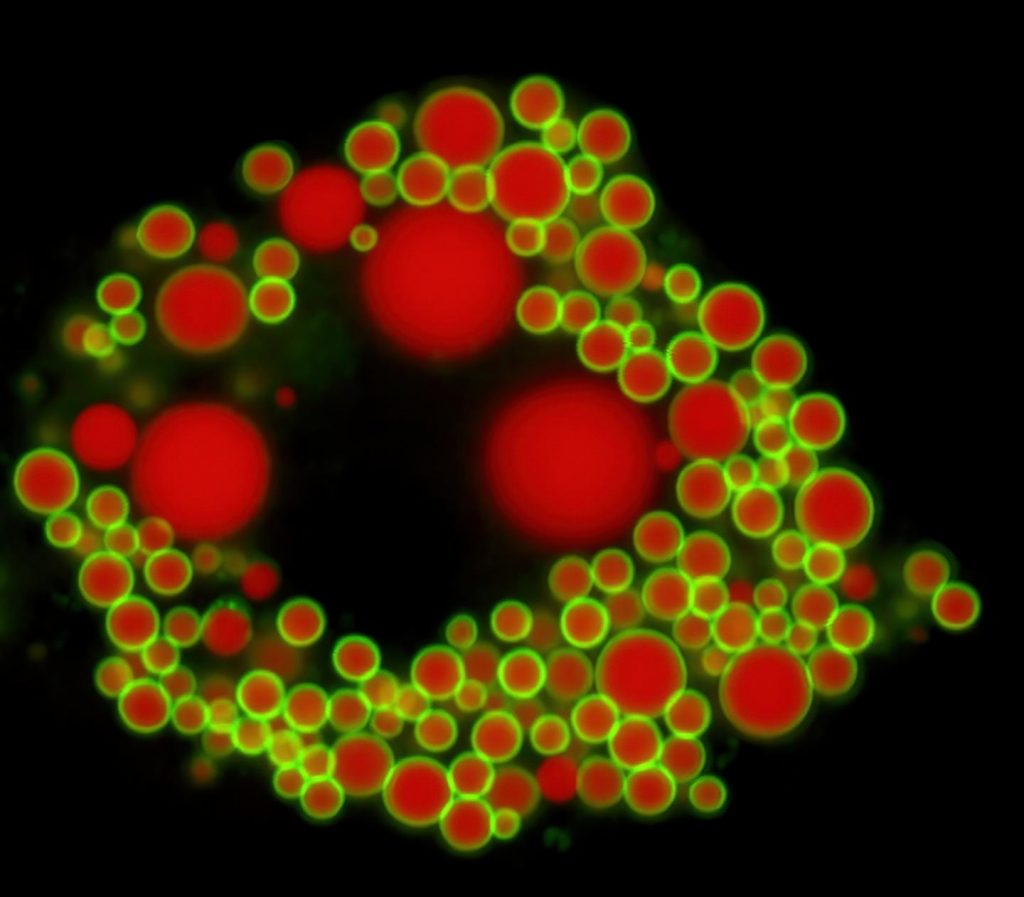Among paleo and keto food followers, coconut oil is often the preferred fat of choice, although its alleged health benefits remain controversial because less is known about how the body metabolizes medium-chain fatty acids. Published in the journal Molecular Metabolism, scientists at the University of Bonn showed how coconut oil is metabolized in the liver, which could have implications for chronic-diarrheal diseases. The study shows that enzymes in fat metabolism in the liver have preferences for certain fatty acids.

Coconut oil differs from rapeseed or olive oil in the fatty acids it contains. Fatty acids consist of carbon atoms bonded together, usually 18 in number. In coconut oil, however, most of these chains are much shorter and contain only 8-to-12 carbon atoms. In the liver, these medium-chain fatty acids are partly converted into storage fats or triglycerides. Exactly how this happens was largely unknown until now.
“There are two enzymes in the liver for storage fat synthesis, DGAT1 and DGAT2,” explains Dr. Klaus Wunderling of the LIMES Institute (Life & Medical Sciences) at the University of Bonn. “We have now seen in mouse liver cells that DGAT1 processes mainly medium-chain fatty acids and DGAT2 processes long-chain ones.”
In the experiment, the researchers blocked DGAT1 with a specific inhibitor. The synthesis of storage fats from medium-chain fatty acids subsequently decreased by 70 percent. In contrast, blocking DGAT2 resulted in reduced processing of long-chain fatty acids. “The enzymes therefore seem to prefer different chain lengths,” concluded Prof. Dr. Christoph Thiele of the LIMES Institute, who led the study.
Beta-Oxidation, Coconut Oil and Medium-Chain Fatty Acids in the Liver
Whether fatty acids in the liver are used at all to build up storage fat depends on the immediate energy requirement. When the body needs a lot of energy at a particular moment, beta oxidation is fired up and the fatty acids are “burned” straight away, so to speak. Medically, this metabolic pathway is of great interest. In diabetes, for instance, it might be useful to reduce beta-oxidation. This is because the body then has to meet its energy needs from glucose instead, causing blood glucose levels to drop, with positive implications for the disease.
As early as some 40 years ago, pharmaceutical researchers therefore developed a corresponding inhibitor called etomoxir. It binds to enzymes required for beta-oxidation, bringing it to a halt. However, it quickly became apparent that etomoxir had severe side effects in that is induces severs oxidative stress.
The researchers in Bonn have now discovered a possible reason for this: They used etomoxir to inhibit the beta-oxidation of medium-chain fatty acids in mice, in anticipation of using it to boost the production of storage fat. “Instead, fat synthesis also decreased significantly, but only of storage fats with medium-chain fatty acids,” Wunderling explains. “We therefore suspect that etomoxir also switches off the DGAT1 enzyme.” In the future, he says, it will be necessary to pay attention to such effects when developing new inhibitors of beta-oxidation.
Also interesting is a finding published a few years ago by Austrian and Dutch scientists: They had studied patients suffering from chronic diarrheal diseases. In 20 of them, they found alterations in the DGAT1 gene that rendered it nonfunctional. “We now want to find out whether the impaired processing of medium-chain fatty acids is responsible for the digestive complaints,” says Wunderling. This is because the DGAT1 enzyme is active not only in the liver but also in the intestine. Perhaps this is why its disorder causes diarrhea when sufferers consume medium-chain fatty acids. Wunderling: “In this case, they could possibly be helped quite simply – with an appropriate diet.
Conclusion/ DGAT1 is the major enzyme for hepatic MCFA-TG synthesis. Its loss can only partially be compensated by DGAT2. Specific inhibition of β-oxidation leads to a compensatory increase in MCFA-TG synthesis, whereas etomoxir blocks both β-oxidation and MCFA-TG synthesis, indicating a strong off-target effect on DGAT1.
Click Here for Full Text Study




